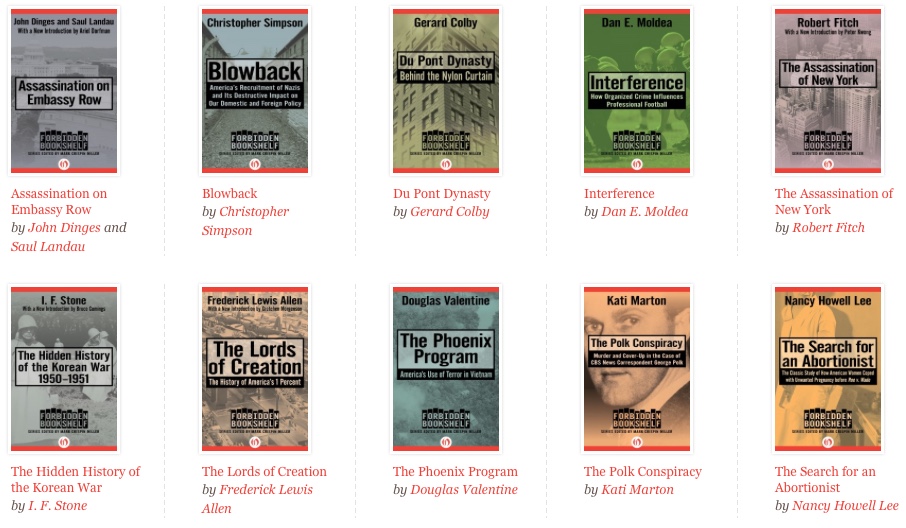These Books Were Forbidden Reading. They Deserve to Be Remembered. And Now They Will Be.
The USA appears to have the freest book trade in the world. We certainly have the biggest, with US publishers producing, every year, over 290,000 new titles and editions: a yield that easily surpasses every other country—even those (like Britain, France, Japan and Germany) whose people read more books than we do; and even those (like India and China) with vastly larger populations.
The size of our book market is astonishing—especially considering the truism that "Americans don't read." Cruise the mighty Amazon (US), or barnesandnoble.com, and you will see so many books, both new and used, for sale in the United States today as would require over 400 miles of shelving to display them—a bookshelf that would stretch from Boston's Old North Church to Ft. McHenry in South Baltimore—and that would take you over three millennia to read them all (if you could plow through one a day).
Surely that huge catalogue is proof of our extraordinary freedom of expression: America does not ban books, because the First Amendment won't allow it. While books are widely banned in states like China, Cuba, Saudi Arabia, Iran and North Korea, and some books banned in many a democracy, no book may be forbidden by the US government at any level (although the CIA routinely censors books by former officers). Where books are banned in the US—as many are—the censors tend to be church groups, school boards, and other local (busy)bodies roused to purify the public schools or libraries nearby (although Wal-Mart too bans books, refusing to sell any that offend the Walton family).
Despite such exceptions, We the People surely can find any book we want, as Madison and Jefferson intended. After all, it's easy to find copies of those famous works that once were banned by the government as too "obscene" to sell, or mail, until the courts ruled otherwise on First Amendment grounds—Ulysses, Lady Chatterly's Lover, Fanny Hill, Tropic of Cancer, Howl and Naked Lunch. We also have no trouble finding copies of the books banned here and there as "anti-family," "Satanic," "racist" and/or "filthy," from Huckleberry Finn, Brave New World and Beloved to The Hunger Games, Heather Has Two Mommies and the Harry Potter series, just to name a few.
II
All of this is certainly good news; and yet it isn't good enough, because it does not mean that the USA enjoys the freest book trade in the world: on the contrary. For over half a century, America's vast book trade has been disparately policed, and imperceptibly contained, by state and corporate entities well-placed and perfectly equipped to wipe out wayward writings. Their ad hoc suppressions through the years have been far more effectual than those quixotic bans imposed on classics like The Catcher in the Rye and Fahrenheit 451. For every one of those best sellers scandalously purged from some provincial school curriculum, there are many others (we can't know how many) that have been so thoroughly erased that few of us, if any, can remember them, or ever heard of them.
How have all those books (to quote George Orwell) "slipped down the memory hole" in these United States? As America does not ban books, other means—less evident, and so less controversial—have been deployed to vaporize them. Some almost never made it into print, as publishers were privately warned off them from on high, either on the grounds of "national security" or with blunt threats of endless corporate litigation. Other books were signed enthusiastically—then "dumped," as their own publishers mysteriously failed to market them, or even properly distribute them. But it has mainly been the press that stamps out inconvenient books, either by ignoring them, or—most often—laughing them off as "conspiracy theory," despite their soundness (or because of it).
Once out of print, those books are gone, even if some few of us have not forgotten them, and one might find used copies here and there. Once out of print, and never mentioned in the press (and seldom mentioned even in our schools), each book thus neutralized mightjust as well have been destroyed en masse—or never written in the first place, for all their contribution to the public good.
Thus We the People have been largely kept in not-so-blissful ignorance of our own history, especially since the USA began its serial crusades abroad (against the Huns, the Reds, the terrorists). Quietly deprived of those enlightening books, Americans are mostly unaware of what America has really done throughout the world, and how those crusades disempowered Americans themselves, and what our leading corporations had to do with it—and, therefore, how America has now become a land with billionaires in charge, millions not allowed to vote, and everybody under full surveillance.
This is why we started the Forbidden Bookshelf: to make such crucial works available again, as e-books, with new introductions. Each year we plan to do a dozen books, reviving vanished classics like The Hidden History of the Korean War, by I.F. Stone, Kati Marton’s The Polk Conspiracy (on the murder of CBS newsman George Polk), and The CIA and the Cult of Intelligence, by Victor Marchetti and John Marks, along with works that were so thoroughly suppressed that few have ever heard of them—like Gerard Colby’s DuPont Dynasty: Behind the Nylon Curtain (a book that DuPont managed to kill twice), Dan Moldea’s Interference (about the NFL’s involvement with organized crime), and Ralph McGehee’s Deadly Deceits: My 25 Years in the CIA.
Such books deserve a second chance; and We the People have the right to hear of them, and read them—and, perhaps, a certain patriotic need to know what’s in them, and why they’ve largely vanished until now.

